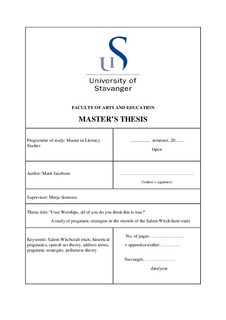| dc.description.abstract | Earlier studies have shown that the successful survival strategy for defendants at Salem was submission and co-operation (Archer 2002:18). The six defendants here studied were accused at an early stage in the process and were all executed. The present study will make use of speech act theory and politeness theory to study the interactions of the defendants with their questioners, with the aim to relate their ultimately unsuccessful defence strategies to the immediate discourse context. The study will also examine the roles of gender, social status and background in the defendants' choices of strategy. The present study will focus on two major areas of study within the field of historical pragmatics: politeness and assertiveness. Politeness theory, building upon the seminal work of Brown and Levinson (1987) has shown itself to be a very useful tool in the study of interactions in historical texts, and has been used in a wide range of studies dealing with Early Modern English materials (e.g. Kahlas-Tarkka 2012). Assertiveness is generally associated with power, and has played an important role in the study of gender differences in language, in particular with reference to male and female conversation strategies (e.g.Tannen 1994). However, the discourse situation in a courtroom is very different from that of normal conversation, in that the power relationship is extremely uneven. In Salem, this would have been the case to an even greater extent than in a present-day court. In today´s courts, one is presumed to be innocent, whereas in the Salem trials, guilt was the presumption. Because of this, in the Salem trials, unlike most social contexts of today, it appears that choosing assertiveness as discourse strategy was not successful (Kahlas-Tarkka 2007: 1). The defendants did cooperate in varying degrees, as they did provide answers to the magistrate's questions. Osborn is the only one of the six who volunteered information connecting to witchcraft, and thus openly accepted the premise that dark powers were involved. Bishop, Osborn and Willard were polite in their answers, they did not use counter-questions or show any signs of sarcasm; while Willard, did laugh, the context suggests that he laughed because he was nervous for not being able to recite the Lord's prayer. After studying the records, there is a clear pattern of confession to avoid execution, which must have become know to the public, since later so many confessed instead of denying the charges. | |
